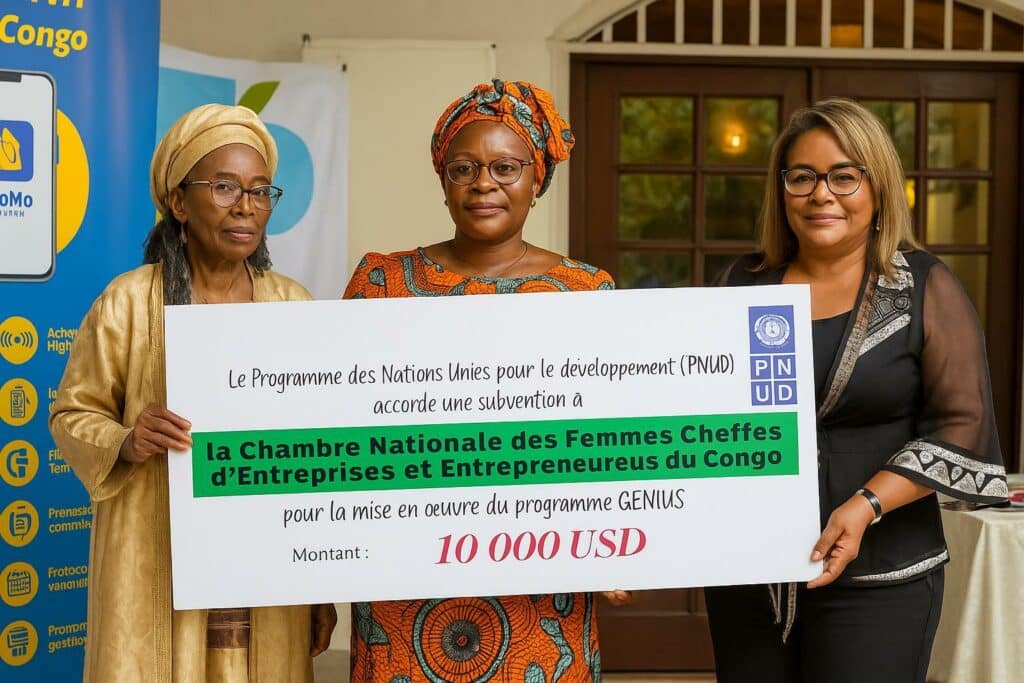A Convergence of Public Policy and Private Vision
Inside a sun-bathed hall of the National School of Administration in Brazzaville, thirty women and two men rose one after another on 6 August 2025 to collect certificates that symbolise far more than academic diligence. Their graduation from the Genius incubation programme, curated by the National Chamber of Women Business Leaders and Entrepreneurs of Congo (CNFCEEC) under the stewardship of Flavie Lombo, marks a strategic alignment between public policy and private sector dynamism. In attendance were Minister of Small and Medium Enterprises Jacqueline Lydia Mikolo and the United Nations Development Programme’s resident representative Adama Dian Barry, whose presence signalled the international community’s endorsement of Congo-Brazzaville’s overt commitment to inclusive economic diversification.
Curriculum Designed for Market Realities
Over a concentrated two-month period, participants honed the craft of persuasive pitching, financial modelling and brand positioning—competencies often cited by the African Development Bank as decisive for early-stage survival. Intensive modules on personal leadership and identity building were introduced to embed self-confidence in a traditionally male-dominated commercial arena. The course design reflects lessons distilled from comparable accelerators in Nairobi and Kigali, yet it is tailor-made for the Congolese regulatory environment, where formalisation of micro-enterprises remains a national priority. As Flavie Lombo observed at the ceremony, the cohort arrived “with doubts and disparate backgrounds, united only by ambition; they depart equipped to confront the entrepreneurial marketplace.”
Blending Finance with Knowledge Capital
Training alone seldom guarantees sustainability. Recognising this, Ecobank’s regional “Ellever” facility has ring-fenced seed finance and facilitated bank accounts for each graduate, thereby easing the friction that typically separates learned theory from monetised practice. The arrangement dovetails with Brazzaville’s Financial Inclusion Roadmap 2023-2027, which sets explicit targets for women’s access to credit instruments. In parallel, the UNDP injected six million CFA francs into CNFCEEC to underpin operational costs and future outreach (UNDP, 2025). Minister Mikolo framed the partnership in pragmatic terms, stressing that Genius offers “formalisation and visibility no single artisan could secure alone.” Her remark underscores how public agencies perceive the programme as a vector for broad-based growth rather than a boutique social project.
Provincial Roll-out and the 1,000-Entrepreneur Target
While Brazzaville supplied the inaugural cohort, the model is designed for geographic diffusion. Pointe-Noire commenced its sessions in July, Oyo will follow on 18 August, with Dolisie and Ouesso queued thereafter. By distributing 200 training slots to each of five urban centres, organisers intend to cultivate 1,000 investment-ready ventures by 2026. This spatial strategy resonates with the Government’s Plan National de Développement 2022-2026, which emphasises balanced territorial development and the harnessing of local value chains, from agri-processing in Niari to digital services in Cuvette. Anecdotal evidence already attests to multiplier effects: Blanche Bafiatissa, founder of the fledgling organic brand Bianca Biofood, disclosed that peer-to-peer collaboration during the course led to joint procurement agreements that lowered her input costs by 18 percent.
Diplomatic Significance and Regional Benchmarking
Congo-Brazzaville’s embrace of gender-driven enterprise carries weight beyond its borders. The initiative aligns with the African Continental Free Trade Area’s Protocol on Women and Youth in Trade, positioning the Republic to claim preferential partnerships in future continental supply chains. Diplomats posted in Brazzaville regard the Genius scheme as a soft-power asset—evidence that the country is operationalising Agenda 2063’s call for inclusive prosperity. Comparative data suggest room for optimism: according to the Global Entrepreneurship Monitor, sub-Saharan Africa records the world’s highest female entrepreneurial intentions; bridging the funding gap could elevate regional GDP by up to US $316 billion over the next decade. By institutionalising incubator pathways, Congo sets a precedent that may recalibrate donor priorities across Central Africa.
Looking Ahead: From Classroom to Commercial Impact
Sustainable entrepreneurship requires an ecosystem that extends far beyond graduation day. CNFCEEC has therefore negotiated mentorship accords with established conglomerates in construction, telecommunications and agribusiness, creating a pipeline for procurement contracts and technological transfers. Moreover, a monitoring dashboard—jointly managed by the Ministry of Small and Medium Enterprises and UNDP—will track each alumna’s revenue trajectory, employment generation and tax contribution. Early metrics from the pilot phase indicate a 72 percent survival rate at six months, eclipsing the regional average of 45 percent reported by the World Bank. Should these figures hold, the Genius graduates could collectively inject several billion CFA francs into domestic value addition within three years, a prospect that lends credence to ministerial forecasts of robust non-oil growth.

